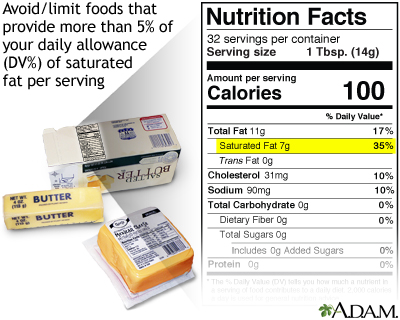
Overview
Saturated fat can raise blood cholesterol and can put you at risk for heart disease and stroke. You should limit your intake of any foods that are high in saturated fat. Sources of saturated fat include whole-milk dairy products, like cheese, ice cream and butter. Animal fats such as beef, pork or chicken, but not fish, are also high in saturated fats. Vegetable sources of saturated fat include coconut and palm oils. When looking at a food label, pay close attention to the percentage of saturated fat. The American Heart Association recommends aiming for a dietary pattern that achieves 5% to 6% of calories from saturated fat. For example, if you need about 2,000 calories a day, no more than 120 calories should come from saturated fats. This is equal to about 13 grams of saturated fat.
Review Date 8/5/2024
Updated by: Thomas S. Metkus, MD, Assistant Professor of Medicine and Surgery, Johns Hopkins University School of Medicine, Baltimore, MD. Also reviewed by David C. Dugdale, MD, Medical Director, Brenda Conaway, Editorial Director, and the A.D.A.M. Editorial team.


